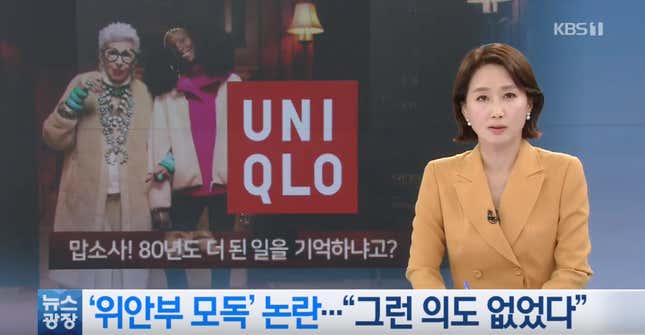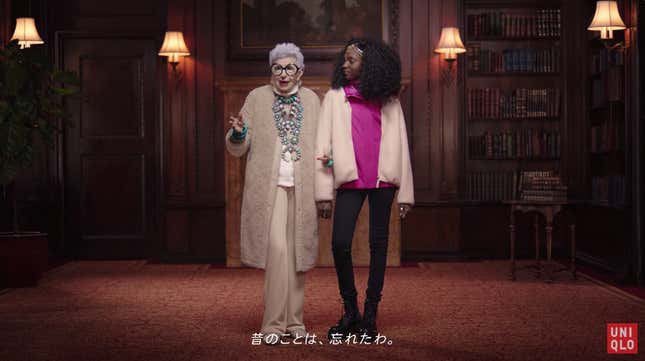
In a recent Uniqlo commercial, 98-year-old fashion model Iris Apfel talks with 13-year-old fashion designer Kheris Rogers. The commercial is in English, and the Korean-language subtitles have caused the Japanese clothing company to pull the ad. Viewers are accusing the subtitled commercial of forgetting the horrors of Japan’s forced occupation.
Apfel speaks English in the ad and is asked how she used to dress when she was the 13-year-old’s age. She replies, “Oh my god, I can’t remember that far back.”
In the Japanese version of the ad, the line is translated into Japanese as “As for things in the past, I forgot ’em.”

However, in the Korean version, the line is translated as her saying, “How can I remember when it was over 80 years ago?” Obviously, the original English differs.
This translation has caused controversy because in South Korea there are claims this is a reference to Japan’s imperial rule of South Korea and all that happened during that period (more here), such as forced labor and sexual slavery. The subtitle controversy has made its way to mainstream Korean news.
The implication is that old people cannot really remember what happened, which would be a pointed condemnation of the surviving comfort women, who are now in their 90s.
In 2015, the Japanese and South Korean government reached an agreement on the comfort women, establishing a $9 million fund to assist them. But former comfort women, like Kim Bok-dong who died earlier this year, want a formal apology from the Japanese government.
Against this backdrop, tensions between Japan and South Korea are currently running high with the South Korean Supreme Court ruling that Japanese companies need to pay for forced wartime factory and mining labor, Japan no longer considering South Korea a trusted trading partner, and Seoul abandoning intelligence sharing with Tokyo. Korean tourism is down in Japan, and in South Korea, there are boycotts on Japanese goods, hurting companies like Uniqlo. The two neighboring countries are not getting along.
At the center of contention is the 1965 Treaty on Basic Relations between Japan and the Republic of Korea. The Japanese point of view is that the treaty states issues of compensation were settled “completely and finally” through Japan’s massive injection of economic aid, which included settlement money, into South Korea. As Lawfare points out, the South Korean government did not pay that money out as compensation to its citizens and instead used it to build up its infrastructure.
However, the Korean view is that the Japanese occupation was unlawful and thus, the South Korean Supreme Court’s ruling is correct. Moreover, the ruling argued that Japan never agreed that colonialism was unjust and therefore the money could never have been intended for victims. You can read more on Lawfare about the ongoing legal wrangling between the two countries.
Tadashi Yanai, Uniqlo’s founder and CEO, has been critical of how the Japanese government has been recently acting toward South Korea, saying it has been “odd” and “hysterical” and that he understands why South Koreans have started boycotting Japanese products.
Uniqlo Korea has pulled the ad but believes this is a misunderstanding. “We can’t really comprehend why it’s controversial, but there might be a misunderstanding,” said Uniqlo Korea, according to SCMP. “We think [the Korean people] have overly interpreted it in that way.”
“The ad was not designed for a specific country. It’s a global advertisement,” Uniqlo Korea added. “The models are real designers 98-year-old Iris Apfel and 13-year-old Kheris Rogers. The subtitles are to highlight their age difference. There are no national or historic connotations.”